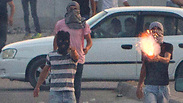
War of independence isn't over yet
Analysis: Israeli Arabs attacking Jewish drivers near Qalansawe and Palestinians launching rockets from Gaza are conveying one, unequivocal message: It's either you or us.
Whether they are Israeli Arabs attacking Jewish drivers near Qalansawe or Palestinians launching rockets from the Gaza Strip, they are conveying one, unequivocal message: It's either you or us.
According to the more softened version, the Arabs have simply lost hope – whether of self-determination in the West Bank and Gaza or of gaining equality within the boundaries of the Green Line.
Ariel Sharon was the last prime minister who managed to engage in a real dialogue with the Arab sector. In the meetings he held with the sector's representatives, he listened to them, promised to improved their living conditions, recognized the state's responsibility for pursuing equal rights, but always demanded that they respect the rule of law indisputably. He warned them not to try to challenge the rule of law in the way we saw over the past weekend, like blocking traffic in Wadi Ara, which he saw as a red line.
Prime Minister Benjamin Netanyahu, unlike Sharon, is dealing with the security reality taking place around us as if it were a random collection of incidents: Issuing a hollow ultimatum to Hamas in Gaza, which remains unfazed and continues to fire at southern Israel; sending the security forces to deal with the rioters in Jerusalem; declaring his support for Kurdish independence instead of proposing an overall solution for the conflict between us and the Palestinians; and justifying his decision to build a wall between us and Jordan.
As for the question how will we be able to continue living here like this, surrounded by walls, iron domes and other missile-intercepting facilities – Netanyahu has no answer.
A prime minister is expected, therefore, to face the public and let it know what he plans to do in order to deal with these events, which resemble the sequence of events that started the second intifada in 2000. Then, at the height of the intifada, the Israeli public removed Ehud Barak from the prime minister's seat.
Today, 14 years later, Netanyahu is sitting on that seat, and he is the one who will shape the state's next borders and the pattern of relations with Israel's Arabs and with the Palestinian entities in the West Bank and Gaza Strip.
In fact, Netanyahu will be the one responsible for the results of the war of independence – ours or theirs.










